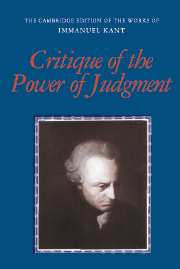Book contents
- Frontmatter
- Contents
- General editors' preface
- Editor's introduction
- First Introduction to the Critique of the Power of Judgment
- Critique of the Power of Judgment
- Preface
- Introduction
- First Part: Critique of the Aesthetic Power of Judgment
- First Section, First Book: Analytic of the Beautiful
- First Section, Second Book: Analytic of the Sublime
- Deduction of Pure Aesthetic Judgments
- Second Section: The Dialectic of the Aesthetic Power of Judgment
- Appendix: On the Methodology of Taste
- Second Part: Critique of the Teleological Power of Judgment
- Appendix: Methodology of the Teleological Power of Judgment
- Method of citation and abbreviations
- Editorial notes
- Glossary
- Index
Deduction of Pure Aesthetic Judgments
Published online by Cambridge University Press: 05 April 2013
- Frontmatter
- Contents
- General editors' preface
- Editor's introduction
- First Introduction to the Critique of the Power of Judgment
- Critique of the Power of Judgment
- Preface
- Introduction
- First Part: Critique of the Aesthetic Power of Judgment
- First Section, First Book: Analytic of the Beautiful
- First Section, Second Book: Analytic of the Sublime
- Deduction of Pure Aesthetic Judgments
- Second Section: The Dialectic of the Aesthetic Power of Judgment
- Appendix: On the Methodology of Taste
- Second Part: Critique of the Teleological Power of Judgment
- Appendix: Methodology of the Teleological Power of Judgment
- Method of citation and abbreviations
- Editorial notes
- Glossary
- Index
Summary
The deduction of aesthetic judgments concerning the objects of nature may not be directed towards that which we call sublime among them, but only to the beautiful.
The claim of an aesthetic judgment to universal validity for every subject, as a judgment that must be based on some principle a priori, needs a deduction (i.e., a legitimation of its presumption), which must be added to its exposition, if, that is, it concerns a satisfaction or dissatisfaction in the form of the object. The judgments of taste concerning the beautiful in nature are of this sort. For in this case the purposiveness has its ground in the object and its shape, even if it does not indicate the relation of the object to others in accordance with concepts (for judgments of cognition), but rather generally concerns merely the apprehension of this form insofar as it shows itself in the mind to be suitable to the faculty both of concepts and of the presentation of them (which is one and the same as that of apprehension). Hence one can also raise many questions in regard to the beautiful in nature, concerning the cause of this purposiveness of its forms: e.g., how is one to explain why nature has spread beauty so extravagantly everywhere, even at the bottom of the ocean, where it is only seldom that the human eye (for which alone, after all, it is purposive) penetrates? and so on.
- Type
- Chapter
- Information
- Critique of the Power of Judgment , pp. 160 - 212Publisher: Cambridge University PressPrint publication year: 2000

